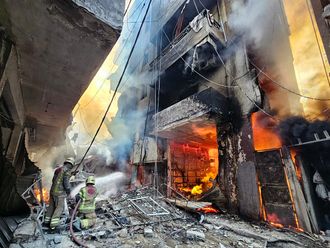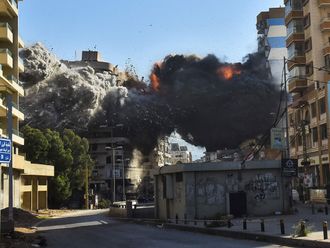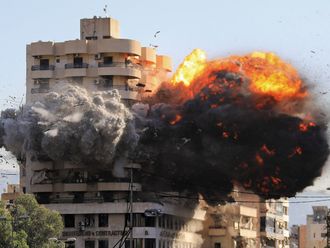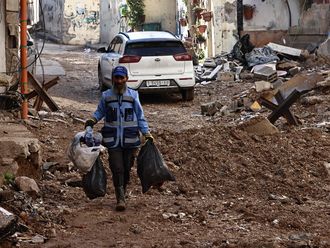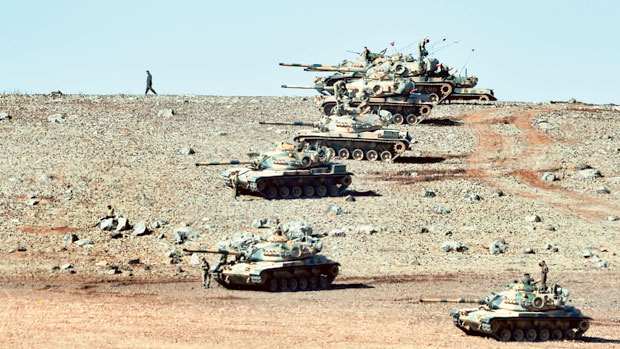
Mursitpinar, Turkey: As each shell fired into Ain Al Arab by Daesh boomed across the countryside on Friday, the journalists positioned on a Turkish ridge nearby rushed to train their cameras on the puffs of smoke rising from the Kurdish town just across the border in Syria.
Turkish soldiers swung their heads to look. And the last residents fleeing what appeared to be the final assault on the town turned back to see what had been hit, and whether it might have been one of their homes.
The Daesh advance on the obscure Kurdish town, called Kobani in Kurdish, has been watched by Turkish troops, monitored by spectators and broadcast live across the world by news channels since the militants launched their offensive two weeks ago. The town is so close to Turkey that the minarets of its mosques can clearly be seen from the Turkish side of the border, as can some of the movements of the approaching Daesh fighters.
But in stark contrast to the response to the onslaught against Iraq’s minority Yazidis and Kurds in August, there has been no serious international effort to halt this Daesh offensive against Kurds in Syria — neither from the Turkish forces deployed in strength around the area nor the US warplanes now flying at will around northern Syria and regularly dropping bombs on Daesh positions elsewhere.
For the Kurds of Ain Al Arab who have now mostly fled into Turkey, the big question is why the United States has not acted to save their town.
US warplanes have struck in the vicinity of Ain Al Arab on up to four occasions since the offensive began — compared with more than 90 strikes carried out around Iraqi Kurdistan in the two weeks after President Barack Obama ordered the US military back into action in Iraq in June. The most recent US attack was reported by Kurdish activists on Friday night and could not be independently confirmed.
“If the Americans wanted to, they could finish Daesh in one day,” said Hamida Mohammad, 30. She was among the last trickle of refugees to flee the abandoned town as Daesh began its onslaught on Friday.
“We don’t know why they don’t,” she added. “Nobody understands why.”
Stumbling response
US officials have struggled to answer the question. Kurdish activists on Twitter have widely disseminated CNN footage of Defence Secretary Chuck Hagel’s stumbling response to a question about the inaction of US forces, in which he said the United States is talking to its “coalition partners” about ways to address Ain Al Arab.
“It’s not a matter of us not being aware of it nor not actively looking at the options we have to deal with it,” he said.
The real reason appears to be that the main focus of the US-led air war remains on Iraq, with any strikes conducted in Syria intended primarily to degrade Daesh’s capacity to operate there, according to Andrew Tabler of the Washington Institute for Near East Policy.
“This is about stabilising Iraq, not about minorities,” he said. “It appears Syria is secondary and strikes are not being carried out with a discernible political or humanitarian strategy.”
US officials asked to explain the inaction in Ain Al Arab cast the answer in similar, if less explicit, terms.
Pentagon spokesman Rear Admiral John Kirby noted to reporters on Friday that air strikes had been conducted in the vicinity of the town, adding that if they could be conducted “in such a way that we’re not going to cause any greater damage or civilian casualties, then… we’re going to do it,” he said.
But, he added, “we’re broadly focused, not just on one city and one town. We have to stay broadly focused on the whole region.”
“The focus in Syria has really been about the safe haven they enjoy,” he said. “In Iraq, it’s really been much more focused on supporting Iraqi security forces and Kurdish forces on the ground.”
No viable partner in Syria
Syria also presents a far more complex set of challenges than Iraq, where the Iraqi government and the Kurdish regional authorities support the US mission. The United States still has no viable partner in Syria, and State Department spokesman Jen Psaki said the US government is focusing its efforts on working with Turkey to find a solution to the conflict on its border, including the possibility of finding a way to unite rival Kurdish and Syrian rebel factions to save Ain Al Arab.
But Turkey remains ambivalent about joining the coalition against Daesh, despite the vote in parliament on Thursday authorising military intervention. Turkey is anxious not to take any action that would embolden its Kurdish foes on either side of the border, and the resolution named the Kurdish Workers Party, or PKK — the parent organisation of the Kurdish militia fighting in Ain Al Arab — as one of the targets of any future military intervention, along with Daesh and Syria’s President Bashar Al Assad.
Turkish Prime Minister Ahmet Davutoglu signalled late Thursday that Turkey might be prepared to act. “We wouldn’t want Kobane to fall. We’ll do whatever we can to prevent this from happening,” Davutoglu told Turkish journalists.
But it remains unclear what Turkey is prepared to do. Meanwhile, the Syrian government and Iran both warned Turkey on Friday that they would regard any intervention in Syria as an act of “aggression”, further complicating the situation.
Kurds say they are bracing to defend Ain Al Arab unaided. The Syrian Kurdish fighters with the YPG — or People’s Protection Unit — are confident they can hold out for days and perhaps weeks. They are motivated and united and unlike the radical Islamist militants, they know the streets, said Ebrahim Kader, a Ain Al Arab activist now in Turkey.
But Turkish forces are preventing supplies from reaching the town and Daesh is surrounding them on three sides. A convoy of food dispatched last week by Iraqi Kurds will soon run out. A video posted online earlier this week showed Kurdish fighters shooting at Daesh tanks with ancient Kalashnikovs, held together with tape.
“If the YPG had tanks, we could defeat them, but we have no heavy weapons,” said Ahmad Mustafa, another of the refugees who left on Friday. “So we are just praying for American air strikes.”


